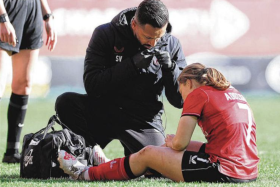You may be losing bone when you lose weight
Make sure you consume enough calcium to retain bone health
There are so many good reasons to start dropping kilos - you look better, feel more confident, and reduce your chances of developing diabetes, high cholesterol and heart disease.
But the downside of weight loss that no one really talks about? Losing bone.
Said Dr Henry Chan, orthopaedic surgeon at Mount Elizabeth Orchard: "Excessive weight loss will trigger the body into a catabolic (deconstruction) state. It will tip the bone repair mechanism into negative balance, so more bone is lost rather than built."
Some experts have estimated that you can lose 16.5g of bone for every 1kg of fat lost, which is not good news for women who are at a higher risk of osteoporosis and fractures.
In a 2006 US study, dieters who lost weight also lost bone in their spine, hips and upper legs - areas most prone to fracturing.
Bone loss is a silent process that shows up only when accidents occur later in life.
According to the Health Promotion Board, hip fractures among women rose five times over the last 30 years in women aged 50 and above.
To help you preserve your bone mass and stay strong, here are some tips to follow:
Calculate your body mass index (BMI)
Your BMI is often the first thing the doctor looks at when assessing your risk of osteoporosis. The healthy range is between 18 and 23. If your BMI falls below 18, you fall into the at-risk group. When you start losing weight, ensure you do not dip below the lower limit.
That said, naturally healthy lightweight people tend not to stress their bones as much and may not need as much bone strength to support their weight.
Say no to crash diets
A short-term diet to fit into your Chinese New Year dress is unlikely to cause any harm, but caloric deprivation lasting more than a few weeks may cause long-term damage to your skeletal health.
A more sensible way of eliminating unnecessary calories? Start with added sugars, snacks and carbonated drinks, said Dr Chan. The key to minimising bone loss is to lose weight gradually through a sensible diet and exercise so the body can adapt and grow fitter, he added.
Get your nutrients
One should ensure an adequate intake of dietary calcium, minerals and vitamin D, according to Dr Leslie Leong, orthopaedic surgeon at Gleneagles Hospital.
The recommended daily allowance of calcium for a typical woman is 800mg or 1,000mg if you are above 50. You can get this amount in two glass of low-fat milk plus a serving of calcium-rich non-dairy food such as spinach and tofu.
To get your vitamin D, be sure to get between five and 30 minutes of sun exposure (early morning is best) at least twice a week.
You can also find vitamin D in fatty fish such as salmon and mackerel and fortified products such as milk, juice and cereal.
Plus, consuming enough protein from lean meat and low-fat dairy products can help you preserve bone density while you lose weight, according to a 2008 study published in the Journal of Nutrition.
Lean protein has the added benefits of preserving muscle mass, lowering blood sugar and reducing fat within the tummy.
Get moving
The best kinds of exercise are weight-bearing movements, such as jogging and walking, and strength training - weight lifting, squats and push-ups.
When you put controlled stress on the bones, you put bone-forming cells to work, resulting in denser bones over time. If you are new to the workout and are at risk of having weaker bones, consult a doctor before starting a new routine.
This article first appeared in Shape (www.shape.com.sg)
Get The New Paper on your phone with the free TNP app. Download from the Apple App Store or Google Play Store now


